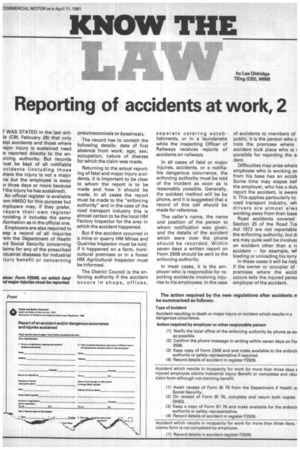KNOW THE
Page 55

If you've noticed an error in this article please click here to report it so we can fix it.
by Les Oldridge TEng (CEO, MIMI
Reporting of accidents at work, 2
IWAS STATED in the last artile (CM, February 28) that only atal accidents and those where lajor injury is sustained need ie reported directly to the en3rcing authority. But records lust be kept of all notifiable ccidents (including those /here the injury is not a major ne but the employee is away )1three days or more because f the injury he has sustained). An official register is available .om HMSO for this purpose but mployers may, if they prefer, repare their own register roviding it includes the same formation as in the official one. Employers are also required to eep a record of all inquiries -om the Department of Health nd Social Security concerning laims for any of the prescribed Idustrial diseases for industrial ijury benefit or concerning
pneumoconiosis or byssinosis.
The record has to contain the following details: date of first absence from work; age; sex; occupation; nature of disease for which the claim was made.
Returning to the actual reporting of fatal and major injury aocidents, it is important to be clear to whom the report is to be made and how it should be made. In all cases the report must be made to the "enforcing authority" and in the.case of the road transport industry this is almost certain to be the local HM Factory Inspector for the area in which the accident happened.
But if the accident occurred in a mine or quarry HM Mines and Quarries Inspector must be told; if it happened on a farm, horticultural premises or in a forest HM Agricultural Inspector must be informed.
The District Council is the enforcing authority if the accident occurs inshops, offices,
separate catering establishments, or in a launderette while the inspecting Officer of Railways receives reports of accidents on railways.
In all cases of fatal or major injuries, accidents, or a notifiable dangerous occurrence, the enforcing authority must be told of the incident as soon as is reasonably possible. Generally, the quickest method will be by phone, and it is suggested that a record of this call should be made for reference.
The caller's name, the name and position of the person to whom notification was given, and the details of the accident which were over the phone should be recorded. Within seven days a written report on Form 2508 should be sent to the enforcing authority.
In most cases, it is the employer who is responsible for reporting accidents involving injuries to his employees. In the case of accidents to members of public, it is the person who c trols the premises where accident took place who is r ponsible for reporting the al dent.
Difficulties may arise where employee who is working av from his base has an accidE Some time may elapse bef the employer, who has a dut} report the accident, is aware it. This applies particularly to road transport industry, wh drivers are almost alwa working away from their base Road accidents covered Section 25 of the Road Tra Act 1972 are not reportable the enforcing authority, but di ers may quite well be involver an accident other than a rE accident — for example, wr loading or unloading his lorry In these cases it will be help if the owner or occupier of premises where the accict occurs tells the injured perso employer of the accident.




































































































